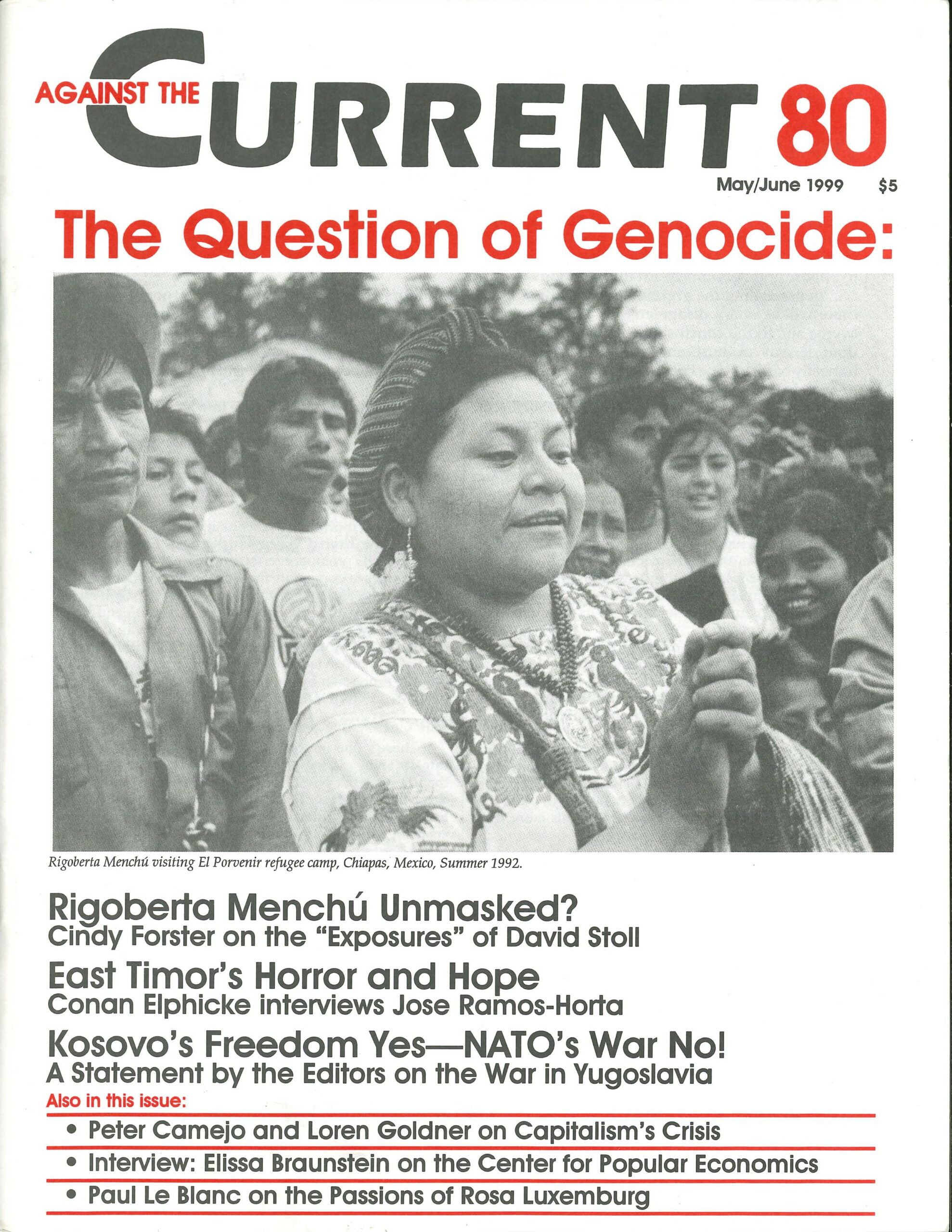Against the Current, No. 80, May/June 1999
-
NATO's Road to War and Ruin
— The Editors -
Waiting to Inhale: Culture Wars or Unfinished Gratification?
— David Roediger -
The Fight for Leonard Peltier
— Hayden Perry -
CPE: Demystifying Economics--Interview with Elissa Braunstein
— Stephanie Luce -
Race and Politics: Indonesia's Ethnic Conflicts
— Malik Miah -
A Profile of East Timor's Jose Ramos-Horta
— Conan Elphicke -
Rigoberta Menchú: A Witness Discredited?
— Cindy Forster -
A Revolutionary Woman in Mind and Spirit: The Passions of Rosa Luxemburg
— Paul Le Blanc -
Random Shots: Weird Sex and Boiled Bacon
— R.F. Kampfer -
The Rebel Girl: A Question of Rape
— Catherine Sameh - Capital's Global Turbulence: A Symposium
-
"Total Capital" Rigor and International Liquidity: A Reply to Robert Brenner
— Loren Goldner -
The Great Bull Market vs. Looming Crisis: On Brenner's Theory of Crisis
— Peter Camejo - Dialogue on Workers in a Lean World
-
On Workers in A Lean World
— Kim Moody -
A Rejoinder
— Ralph Armbruster-Sandoval - Reviews
-
Glaberman and Faber's Working for Wages
— Sheila Cohen -
The Availability of Utopian Thought
— Terry Murphy - Letters to Against the Current
-
Letter and Response on Mumia Abu-Jamal
— Sidney Gendin and Steve Bloom - In Memoriam
-
Comrade and Friend: Bob Strowiss 1919-1999
— Edmund Kovacs
Catherine Sameh
“My vagina was my village.”
Eve Ensler
ON JUNE June 27, 1996, a United Nations court indicted eight Bosnian Serb military and police officers for the rapes of Muslim women in the Bosnian war. According to a New York Times article on June 28, 1996, investigators of the European Union and Amnesty International “calculated that in 1992, 20,000 Muslim women and girls were raped by Serbs.”
Other estimates put the total number of Muslim, Croat and Serb women raped between 1991 and 1995 at 70,000. While rape and other sexual assaults against women have been documented in many twentieth century wars, for the first time in history, rape was formally defined as a war crime.
By 1997, when Bosnians Jadranka Cigelj and Nusreta Sivac began their twenty-five-city American tour sponsored by Amnesty International, the indicted Serbs had not been turned over to authorities. Cigelj and Sivac are the subjects of the documentary film, “Calling the Ghosts: A Story About Rape, War and Women.”
Produced by Mandy Jacobson and Karmen Jelincic, the film centers on Cigelj’s and Sivac’s confinement in the Omarska prison camp, where they and other women were repeatedly raped by Serbian military men, and their subsequent decision to testify at the Hague.
While the present conflict in Kosovo is not identical to Bosnia, the documented and publicized mass rape of women and girls in Bosnia reminds us of the numerous ways women are terrorized and brutalized in war. One newsclip on National Public Radio stated that there are reports of the Serbian military rounding up “attractive women,” presumably for rape, but that was the extent of the clip.
While the left debates NATO’s intervention in Kosovo for months, even, years to come, many questions will remain about how to respond to the daily crimes of Milosevic and his men. Among those questions should be: How does an international anti-war movement address the systematic rape and assault of women and girls? What role should the United States play in trying to prevent this war crime, or see its perpetrators punished?
This last question rests on a mountain of hypocrisy, considering more than 100,000 plus reported rapes that occur each year at home, let alone the historic rape of Third World women carried out by U.S. soldiers in times of war. While feminists have worked hard to build an alternative sexual ethic between men and women, and challenge the legal system to respond to rape as a crime of violence, the foundations of that work are continually eroded by a culture still mired in patriarchal traditions.
The Kosovo conflict poses many hard questions. Let us not leave women and girls out of this increasingly complicated equation.
ATC 80, May-June 1999

